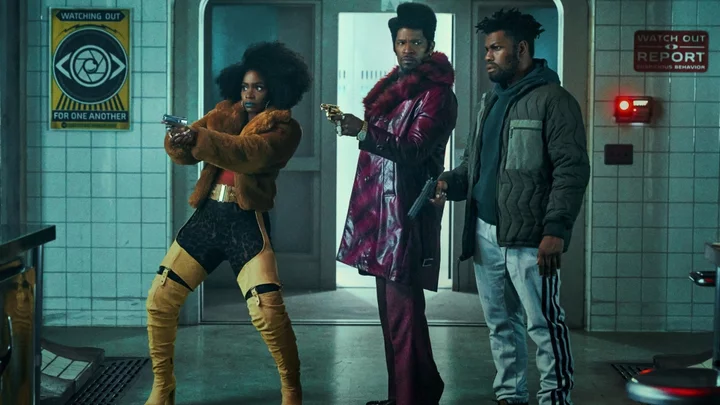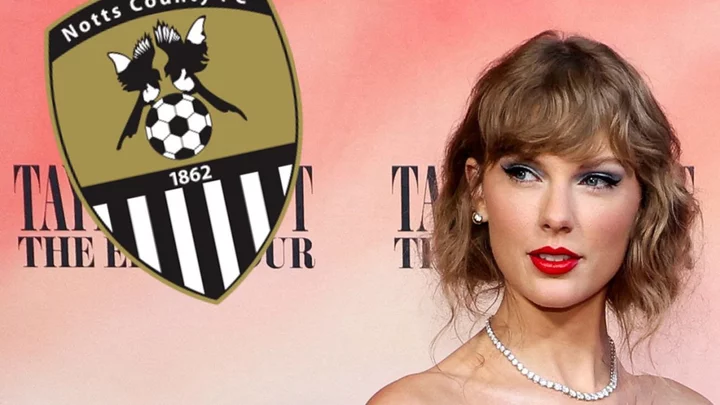Hollywood has been caught in a tailspin ever since Get Out, with a number of genre films and shows — like Antebellum, Them, and even Don't Worry Darling — trying and failing to re-capture Jordan Peele's socially tinged horror-comedy magic. In that vein, Netflix's They Cloned Tyrone has the right idea when it comes to channeling Peele; first and foremost, it bears fewer similarities to Get Out than it does to its cerebral, class-conscious follow-up, Us (a well from which few filmmakers have drawn). Second, those similarities are largely structural and skin-deep, and the film is better for it. It may only be thrilling in spurts, but it's also raucously entertaining.
The directorial debut of Juel Taylor, who co-wrote the script with Tony Rettenmaier, They Cloned Tyrone is a tonally delightful (if at times conceptually half-baked) romp that occasionally harkens back to the Blaxploitation era, but mostly treads its own path. It's led by a trio of fine-tuned, firecracker performances from John Boyega, Teyonah Parris, and Jamie Foxx, and while it'll be available to stream on July 21 — Barbenheimer weekend just got more complicated — it's worth watching in a crowded theater if you have the chance.
Wait… What's the premise of They Cloned Tyrone?
Credit: Parrish Lewis/NetflixAs shown in its trailer, They Cloned Tyrone follows the unearthing of a government conspiracy hiding in plain sight, with secret scientific facilities just beneath an impoverished Black neighborhood. Given the movie's title, it wouldn't exactly be a spoiler to mention its sci-fi nature, though there are plenty of twists and turns in store. Most of them, despite being telegraphed from miles away, work exactly as intended, except for the film's ultimate exposition dump, which doesn't quite tie together otherwise potent themes. But in the meantime, the film builds skillfully and in unexpected ways, so that even if its various reveals seem obvious to the viewer, watching the characters discover them one by one becomes part of the fun.
Boyega plays Fontaine, a local dope dealer in a rundown suburb dubbed "The Glen." It shares its nickname with several American neighborhoods, but its location is about as fictitious, anonymous, and intentionally generic as Springfield on The Simpsons. It's a stand-in for several aspects of the Black American experience, from the way poverty forces people into crime, to the way communities develop a shared sense of language, understanding and identity within these circumstances. Every character Fontaine comes into contact with — whether their exchange is pleasant or adversarial — makes The Glen feel vivid and alive, even if the movie's darkened color-timing doesn't always let you see what's on screen. In this way, it's a Netflix movie through and through, for better or worse (its dim, flat appearance is likely a result of technical specifications required by the streaming giant).
There's also something temporally odd about this neighborhood and the way it's captured. The film's opening credits harken back to Blaxploitation films from the 1970s, from their loud font and faded yellow design, to the gate weave that makes the title card jitter, as if it were being screened on a rickety film projector. The movie's physical texture makes it feel, at times, like a relic from decades prior. Each frame is spackled with digital noise to mimic celluloid grain, but with the low contrast lighting design of a modern digital production. It sometimes gives the impression of rediscovered pulp or grindhouse classic, albeit without classical blocking, stylized framing, or pulpy flourishes like crash-zooms. This might seem, at first, like a failure of cinematic language, especially since Taylor's filmmaking is much more modern — more vérité and in-your-face. However, this aesthetic disconnect between past and present styles is fitting, given the story at hand.
Foxx's character, the stylish but arrogant pimp Slick Charles — who owes Fontaine money — is a distinct archetype of the Blaxploitation genre both in behavior and style, as is Parris's sweet and ambitious sex worker Yo-Yo. The Funk soundtrack, '70s sedans and voluminous natural hairstyles are even more to the point about this premise — and yet, They Cloned Tyrone isn't set in the '70s. Fontaine, whose own attire, hair and golden grills aren't particularly era-specific, interacts with a young neighborhood boy who watches recently aired Spongebob episodes from the mid-2000s, while a rival drug dealer uses a Motorola Razr from the same era. Surely, then, the film must be a throwback to a time when hip hop and Black culture had recently achieved global prominence, while paying further homage to another emergent cultural milieu from decades prior? Well, one would think, but references to modern cryptocurrency make pinpointing its setting far more complicated.
It's a tension the film doesn't really acknowledge (albeit with good reason), but it adds to the eeriness of what appear to be mundane interactions from day to day, as if Fontaine were caught in a mind-numbing, Groundhog Day-esque time loop, chatting with characters who deliver repetitive dialogue like video game NPCs, and with people behind closed doors. But about 15 minutes into its runtime, They Cloned Tyrone takes an enormous swing that places the audiences far ahead of the characters in terms of the amount of information it chooses to reveal, and the specific, violent event through which it reveals it. From there on out, it's off to the races.
They Cloned Tyrone is a propulsive comedy-thriller with weight.
Credit: Parrish Lewis/NetflixSoon, Fontaine begins catching on to the fact that something is amiss, thanks in part to the presence of government-owned black SUVs spotted around The Glen. With Slick and Yo-Yo in tow, he begins looking into strange goings on involving missing persons, underground facilities, and the apparent injection of mysterious, mind-altering substances into products stereotypically associated with Black communities: fried chicken, hair straightener, and grape-flavored drinks, which are advertised to the trio ad nauseam via capitalistic TV networks. To make literal its "opiate of the masses" undertone — a phrase coined by Karl Marx when referring to religion — the film even introduces the idea that The Glen's local church sermons are laced with subliminal messaging.
With Yo-Yo's guidance — she's an avid reader of Nancy Drew — the trio bites off far more than they can chew by investigating this sprawling conspiracy, leading to situations in which their paranoia is equal parts relatable and hilarious. Taylor brings glimmering truths of lived experience to even the most absurd situations, which see The Glen's residents acting strangely but in deeply human and familiar ways, forcing Yo-Yo, Slick and Fontaine to dig deeper each time the "forces that be" go to extreme lengths to avoid detection.
But perhaps the ultimate lived experience to be found in They Cloned Tyrone is the sense that the characters' lives may not be entirely in their own control, which turns their thoughts immediately toward government conspiracy. Despite its occasional Blaxploitation throwbacks, the film is, in this way, distinctly modern in its evocation of online conspiracy theorizing. However, it also roots its answers in cultural specificities, recalling the U.S. government's Tuskegee Syphilis Experiments and the CIA's alleged injection of crack cocaine into Black communities. Of course, cloning is much more far-fetched than diseases and drugs, but in They Cloned Tyrone, it's just the tip of the iceberg. The steady unraveling of the whole truth ends up roping nearly all of The Glen's residents into an all-out war, often to knee-slapping results.
It becomes, essentially, a war for autonomy. This is the one way They Cloned Tyrone conjuring the unavoidable specter of Get Out, though it goes about it rather differently — but just when it seems like the film has reached its action-comedy crescendo, it takes a sharp left tonal turn, forcing a much deeper rumination on its underlying themes. While Foxx and Parris maintain quips a-plenty, this is where Boyega most shines.
They Cloned Tyrone is a meaningful drama, too.
Hollywood has, unfortunately, not given Boyega his due despite casting him in major projects, like Disney's Star Wars sequel trilogy and Pacific Rim: Uprising. He has since looked elsewhere for emotional meat, like Steve McQueen's UK production Small Axe, and the American indie Breaking, though the Netflix-distributed They Cloned Tyrone looks to make good on this unkept promise.
The film works as a darkly comedic B-side to Attack the Block, Boyega's mile-a-minute UK alien invasion breakout from 2011 (which was followed by his memorable supporting role in the Nigerian drama Half of a Yellow Sun; Hollywood really has done him dirty). Both Attack the Block and They Cloned Tyrone deal with the existential question of a person's inherent worth when they're born condemned by larger systems. They Cloned Tyrone bakes this question into its sci-fi premise, and while it's rife with hilarious and propulsive moments, it also affords Boyega the time and breathing room to embody this notion, bringing him face to face with docile and subservient visions of himself.
Granted, the movie perhaps goes too far with this premise, thanks to one final reveal that feels unfortunately at odds with its own approach. However, by keeping Boyega at its epicenter, it maintains a realistic emotional grounding that keeps it from flying too far off the rails. Meanwhile, Taylor and cinematographer Ken Seng also maintain a sense of momentum that might otherwise have been knee-capped by such an ill-considered twist, often using well-disguised long takes that keep the action centered at all times.
In the moments the film isn't actively charging towards its explosive (though in some ways, disappointing) conclusion, the filmmakers imbue its more subdued scenes with askew framing. Whether during moments of realization or even simple exchanges of dialogue, the camera makes Fontaine feel unmoored from time and place; Taylor knows how to use Boyega's sense of simmering frustration like few other American filmmakers, and he deploys it to both dramatic and comedic effect.
As an intellectual exercise, They Cloned Tyrone is at least mildly frustrating. But as a comedy with meaningful emotional underpinnings, it's a wild ride that seldom slows down, and demands to be experienced with a crowd.
They Cloned Tyrone premieres in theaters July 13 and on Netflix July 21.









